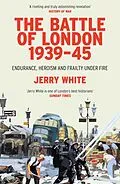'Endlessly fascinating. . . White is such a brilliant historian' Mail on Sunday
Lasting for six long years, the Blitz transformed life in the capital beyond recognition, marking a time of almost constant anxiety, disruption, deprivation and sacrifice for Londoners. With the capital the nation's frontline during the Second World War, by its end, 30,000 inhabitants had lost their lives.
While much has been written about 'the Myth of the Blitz', its riveting social history has often been overlooked. Unearthing what it was actually like for those living through those tempestuous years, Jerry White paints a fascinating portrait of the daily lives of ordinary Londoners, telling the story through their own voices.
'As a history of the capital in wartime, it is probably unsurpassable' Sunday Telegraph
'An impressive history of the capital at war. . . White, an accomplished chronicler of London's history, tells it with brio and a confident mastery of the sources' Literary Review
Autorentext
Jerry White
Klappentext
The definitive social history of London in the Blitz, which transformed life in the capital beyond recognition.
For Londoners the six long years of the Second World War were a time of almost constant anxiety, disruption, deprivation and sacrifice. The Blitz began in earnest in September 1940 and from then on, for prolonged periods, London was under sustained aerial bombardment by night and by day. Throughout the war, the capital was the nation's front line; by its end, 30,000 Londoners had lost their lives.
Yet if the bombing defined the era for those who lived through it, the months of terror were outnumbered by those spent knitting together the fabric of daily life at work, in the home, on the allotment, in the cinema or theatre and, not least, standing in those interminable queues for daily necessities that were such a feature of London's war.
Much has been written about 'the Myth of the Blitz' but in this riveting social history, Jerry White has unearthed what actually happened during those tempestuous years, getting close up to the daily lives of ordinary people, telling the story through their own voices. At the end of it all, the Battle of London was won not on the playing fields of Eton but in the playgrounds of a thousand council elementary schools across the capital.
